QAB020X602H - Training Programs Impact on Hotel Employee Turnover
VerifiedAdded on 2023/06/15
|26
|10427
|367
Report
AI Summary
This research paper explores the relationship between effective training programs and employee turnover in London's hospitality/hotel industry. It addresses the high turnover rates, particularly in light of Brexit and the pandemic, and investigates how training and development can improve employee commitment and reduce migration. The study aims to identify factors influencing employee motivation and behavior, assessing the impact of training on job satisfaction, productivity, and retention. Through a literature review and methodological approach, the research seeks to provide insights into the benefits of training programs and their role in mitigating the challenges posed by labor shortages and high turnover within the London hotel sector.
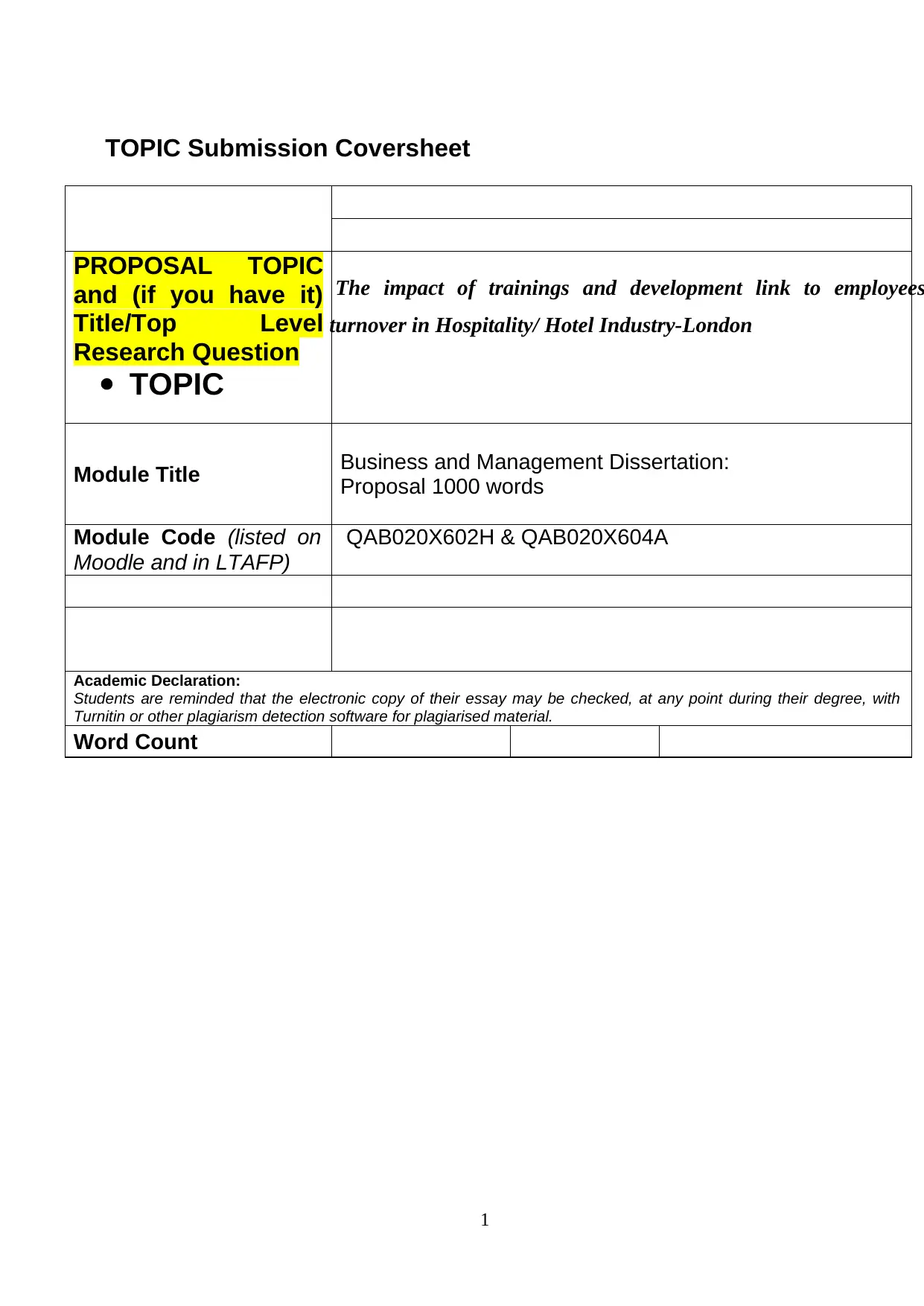
TOPIC Submission Coversheet
PROPOSAL TOPIC
and (if you have it)
Title/Top Level
Research Question
TOPIC
The impact of trainings and development link to employees
turnover in Hospitality/ Hotel Industry-London
Module Title Business and Management Dissertation:
Proposal 1000 words
Module Code (listed on
Moodle and in LTAFP)
QAB020X602H & QAB020X604A
Academic Declaration:
Students are reminded that the electronic copy of their essay may be checked, at any point during their degree, with
Turnitin or other plagiarism detection software for plagiarised material.
Word Count
1
PROPOSAL TOPIC
and (if you have it)
Title/Top Level
Research Question
TOPIC
The impact of trainings and development link to employees
turnover in Hospitality/ Hotel Industry-London
Module Title Business and Management Dissertation:
Proposal 1000 words
Module Code (listed on
Moodle and in LTAFP)
QAB020X602H & QAB020X604A
Academic Declaration:
Students are reminded that the electronic copy of their essay may be checked, at any point during their degree, with
Turnitin or other plagiarism detection software for plagiarised material.
Word Count
1
Paraphrase This Document
Need a fresh take? Get an instant paraphrase of this document with our AI Paraphraser
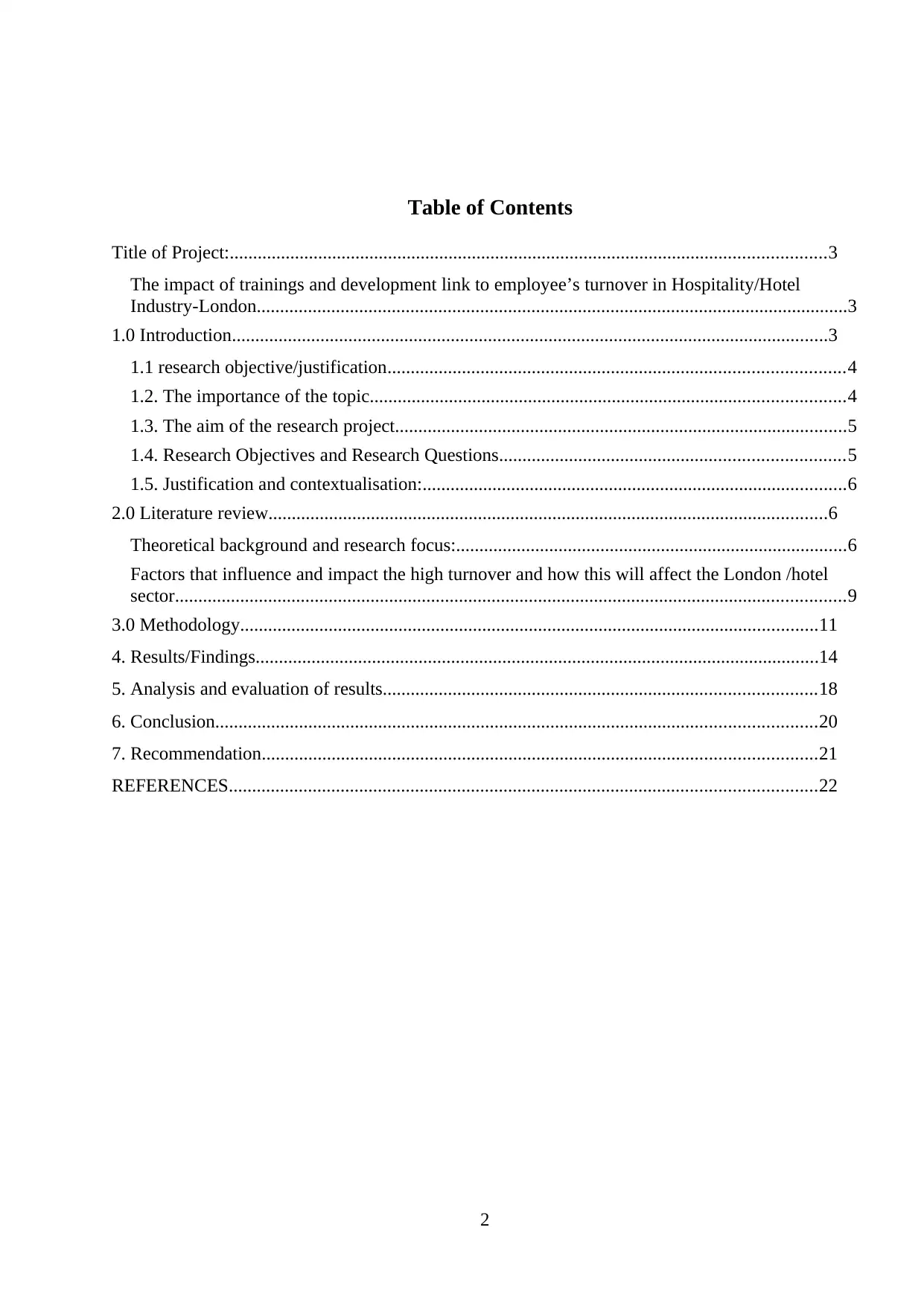
Table of Contents
Title of Project:................................................................................................................................3
The impact of trainings and development link to employee’s turnover in Hospitality/Hotel
Industry-London...............................................................................................................................3
1.0 Introduction................................................................................................................................3
1.1 research objective/justification..................................................................................................4
1.2. The importance of the topic......................................................................................................4
1.3. The aim of the research project.................................................................................................5
1.4. Research Objectives and Research Questions..........................................................................5
1.5. Justification and contextualisation:...........................................................................................6
2.0 Literature review........................................................................................................................6
Theoretical background and research focus:....................................................................................6
Factors that influence and impact the high turnover and how this will affect the London /hotel
sector................................................................................................................................................9
3.0 Methodology............................................................................................................................11
4. Results/Findings.........................................................................................................................14
5. Analysis and evaluation of results.............................................................................................18
6. Conclusion.................................................................................................................................20
7. Recommendation.......................................................................................................................21
REFERENCES..............................................................................................................................22
2
Title of Project:................................................................................................................................3
The impact of trainings and development link to employee’s turnover in Hospitality/Hotel
Industry-London...............................................................................................................................3
1.0 Introduction................................................................................................................................3
1.1 research objective/justification..................................................................................................4
1.2. The importance of the topic......................................................................................................4
1.3. The aim of the research project.................................................................................................5
1.4. Research Objectives and Research Questions..........................................................................5
1.5. Justification and contextualisation:...........................................................................................6
2.0 Literature review........................................................................................................................6
Theoretical background and research focus:....................................................................................6
Factors that influence and impact the high turnover and how this will affect the London /hotel
sector................................................................................................................................................9
3.0 Methodology............................................................................................................................11
4. Results/Findings.........................................................................................................................14
5. Analysis and evaluation of results.............................................................................................18
6. Conclusion.................................................................................................................................20
7. Recommendation.......................................................................................................................21
REFERENCES..............................................................................................................................22
2
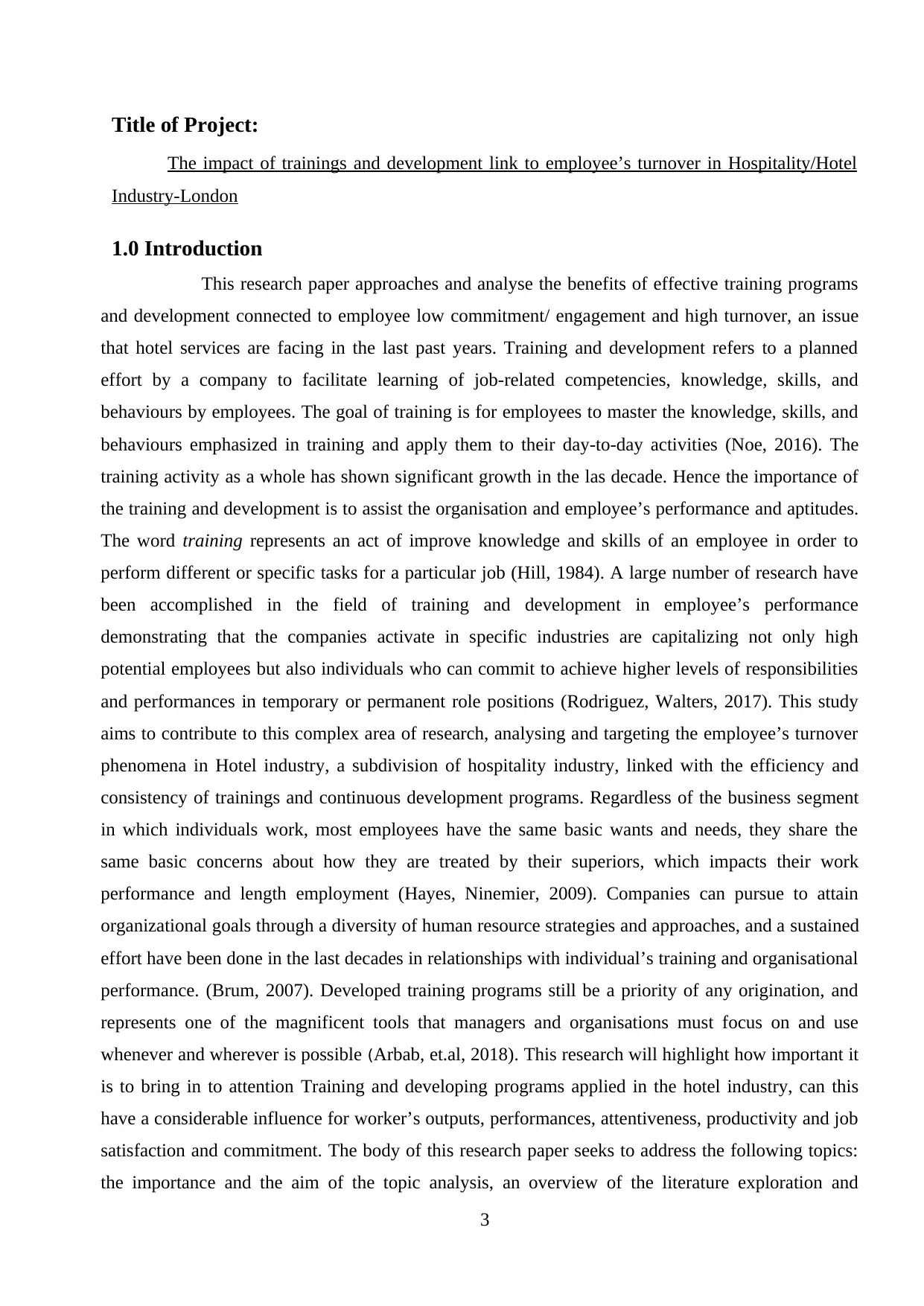
Title of Project:
The impact of trainings and development link to employee’s turnover in Hospitality/Hotel
Industry-London
1.0 Introduction
This research paper approaches and analyse the benefits of effective training programs
and development connected to employee low commitment/ engagement and high turnover, an issue
that hotel services are facing in the last past years. Training and development refers to a planned
effort by a company to facilitate learning of job-related competencies, knowledge, skills, and
behaviours by employees. The goal of training is for employees to master the knowledge, skills, and
behaviours emphasized in training and apply them to their day-to-day activities (Noe, 2016). The
training activity as a whole has shown significant growth in the las decade. Hence the importance of
the training and development is to assist the organisation and employee’s performance and aptitudes.
The word training represents an act of improve knowledge and skills of an employee in order to
perform different or specific tasks for a particular job (Hill, 1984). A large number of research have
been accomplished in the field of training and development in employee’s performance
demonstrating that the companies activate in specific industries are capitalizing not only high
potential employees but also individuals who can commit to achieve higher levels of responsibilities
and performances in temporary or permanent role positions (Rodriguez, Walters, 2017). This study
aims to contribute to this complex area of research, analysing and targeting the employee’s turnover
phenomena in Hotel industry, a subdivision of hospitality industry, linked with the efficiency and
consistency of trainings and continuous development programs. Regardless of the business segment
in which individuals work, most employees have the same basic wants and needs, they share the
same basic concerns about how they are treated by their superiors, which impacts their work
performance and length employment (Hayes, Ninemier, 2009). Companies can pursue to attain
organizational goals through a diversity of human resource strategies and approaches, and a sustained
effort have been done in the last decades in relationships with individual’s training and organisational
performance. (Brum, 2007). Developed training programs still be a priority of any origination, and
represents one of the magnificent tools that managers and organisations must focus on and use
whenever and wherever is possible (Arbab, et.al, 2018). This research will highlight how important it
is to bring in to attention Training and developing programs applied in the hotel industry, can this
have a considerable influence for worker’s outputs, performances, attentiveness, productivity and job
satisfaction and commitment. The body of this research paper seeks to address the following topics:
the importance and the aim of the topic analysis, an overview of the literature exploration and
3
The impact of trainings and development link to employee’s turnover in Hospitality/Hotel
Industry-London
1.0 Introduction
This research paper approaches and analyse the benefits of effective training programs
and development connected to employee low commitment/ engagement and high turnover, an issue
that hotel services are facing in the last past years. Training and development refers to a planned
effort by a company to facilitate learning of job-related competencies, knowledge, skills, and
behaviours by employees. The goal of training is for employees to master the knowledge, skills, and
behaviours emphasized in training and apply them to their day-to-day activities (Noe, 2016). The
training activity as a whole has shown significant growth in the las decade. Hence the importance of
the training and development is to assist the organisation and employee’s performance and aptitudes.
The word training represents an act of improve knowledge and skills of an employee in order to
perform different or specific tasks for a particular job (Hill, 1984). A large number of research have
been accomplished in the field of training and development in employee’s performance
demonstrating that the companies activate in specific industries are capitalizing not only high
potential employees but also individuals who can commit to achieve higher levels of responsibilities
and performances in temporary or permanent role positions (Rodriguez, Walters, 2017). This study
aims to contribute to this complex area of research, analysing and targeting the employee’s turnover
phenomena in Hotel industry, a subdivision of hospitality industry, linked with the efficiency and
consistency of trainings and continuous development programs. Regardless of the business segment
in which individuals work, most employees have the same basic wants and needs, they share the
same basic concerns about how they are treated by their superiors, which impacts their work
performance and length employment (Hayes, Ninemier, 2009). Companies can pursue to attain
organizational goals through a diversity of human resource strategies and approaches, and a sustained
effort have been done in the last decades in relationships with individual’s training and organisational
performance. (Brum, 2007). Developed training programs still be a priority of any origination, and
represents one of the magnificent tools that managers and organisations must focus on and use
whenever and wherever is possible (Arbab, et.al, 2018). This research will highlight how important it
is to bring in to attention Training and developing programs applied in the hotel industry, can this
have a considerable influence for worker’s outputs, performances, attentiveness, productivity and job
satisfaction and commitment. The body of this research paper seeks to address the following topics:
the importance and the aim of the topic analysis, an overview of the literature exploration and
3
⊘ This is a preview!⊘
Do you want full access?
Subscribe today to unlock all pages.

Trusted by 1+ million students worldwide
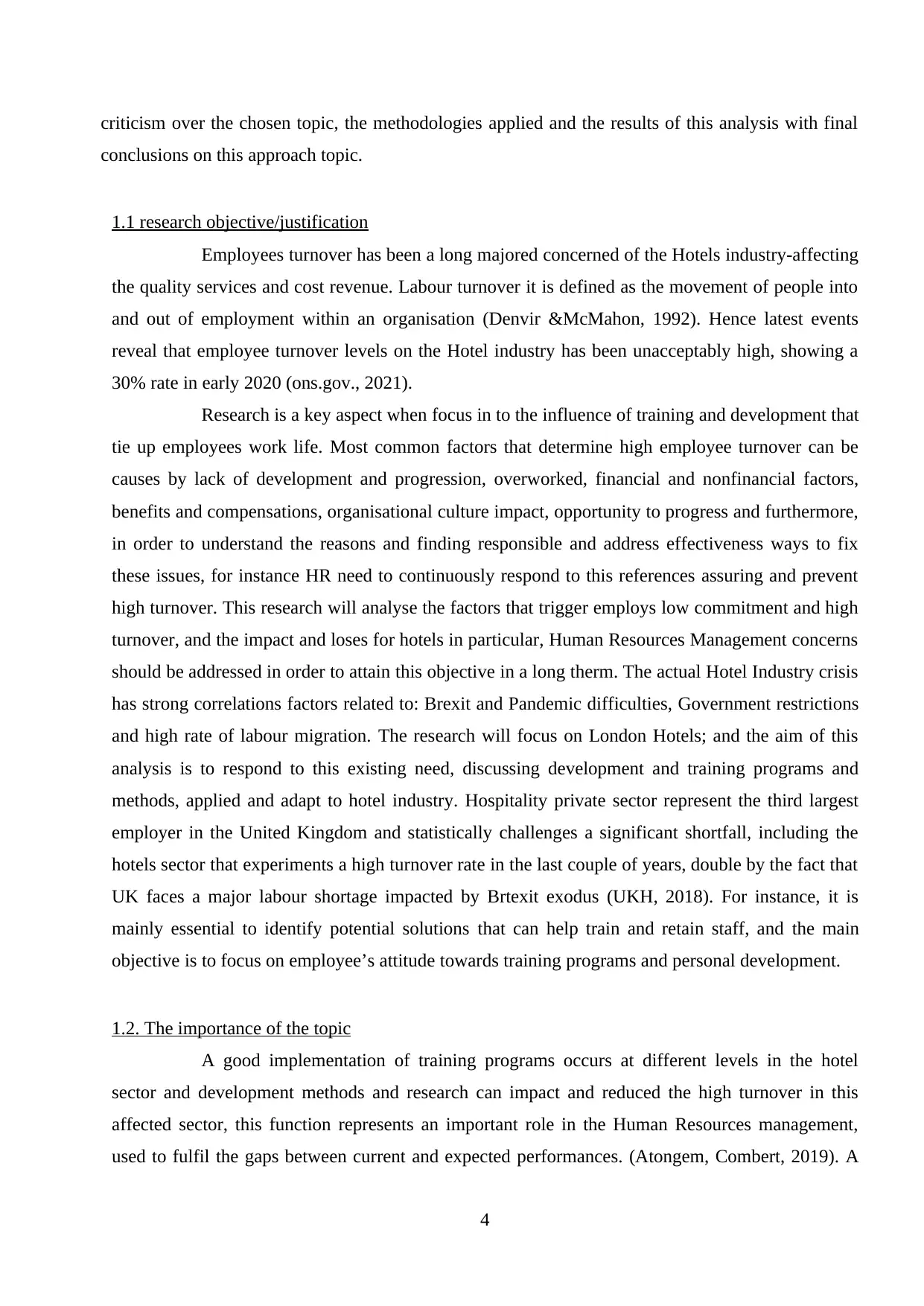
criticism over the chosen topic, the methodologies applied and the results of this analysis with final
conclusions on this approach topic.
1.1 research objective/justification
Employees turnover has been a long majored concerned of the Hotels industry-affecting
the quality services and cost revenue. Labour turnover it is defined as the movement of people into
and out of employment within an organisation (Denvir &McMahon, 1992). Hence latest events
reveal that employee turnover levels on the Hotel industry has been unacceptably high, showing a
30% rate in early 2020 (ons.gov., 2021).
Research is a key aspect when focus in to the influence of training and development that
tie up employees work life. Most common factors that determine high employee turnover can be
causes by lack of development and progression, overworked, financial and nonfinancial factors,
benefits and compensations, organisational culture impact, opportunity to progress and furthermore,
in order to understand the reasons and finding responsible and address effectiveness ways to fix
these issues, for instance HR need to continuously respond to this references assuring and prevent
high turnover. This research will analyse the factors that trigger employs low commitment and high
turnover, and the impact and loses for hotels in particular, Human Resources Management concerns
should be addressed in order to attain this objective in a long therm. The actual Hotel Industry crisis
has strong correlations factors related to: Brexit and Pandemic difficulties, Government restrictions
and high rate of labour migration. The research will focus on London Hotels; and the aim of this
analysis is to respond to this existing need, discussing development and training programs and
methods, applied and adapt to hotel industry. Hospitality private sector represent the third largest
employer in the United Kingdom and statistically challenges a significant shortfall, including the
hotels sector that experiments a high turnover rate in the last couple of years, double by the fact that
UK faces a major labour shortage impacted by Brtexit exodus (UKH, 2018). For instance, it is
mainly essential to identify potential solutions that can help train and retain staff, and the main
objective is to focus on employee’s attitude towards training programs and personal development.
1.2. The importance of the topic
A good implementation of training programs occurs at different levels in the hotel
sector and development methods and research can impact and reduced the high turnover in this
affected sector, this function represents an important role in the Human Resources management,
used to fulfil the gaps between current and expected performances. (Atongem, Combert, 2019). A
4
conclusions on this approach topic.
1.1 research objective/justification
Employees turnover has been a long majored concerned of the Hotels industry-affecting
the quality services and cost revenue. Labour turnover it is defined as the movement of people into
and out of employment within an organisation (Denvir &McMahon, 1992). Hence latest events
reveal that employee turnover levels on the Hotel industry has been unacceptably high, showing a
30% rate in early 2020 (ons.gov., 2021).
Research is a key aspect when focus in to the influence of training and development that
tie up employees work life. Most common factors that determine high employee turnover can be
causes by lack of development and progression, overworked, financial and nonfinancial factors,
benefits and compensations, organisational culture impact, opportunity to progress and furthermore,
in order to understand the reasons and finding responsible and address effectiveness ways to fix
these issues, for instance HR need to continuously respond to this references assuring and prevent
high turnover. This research will analyse the factors that trigger employs low commitment and high
turnover, and the impact and loses for hotels in particular, Human Resources Management concerns
should be addressed in order to attain this objective in a long therm. The actual Hotel Industry crisis
has strong correlations factors related to: Brexit and Pandemic difficulties, Government restrictions
and high rate of labour migration. The research will focus on London Hotels; and the aim of this
analysis is to respond to this existing need, discussing development and training programs and
methods, applied and adapt to hotel industry. Hospitality private sector represent the third largest
employer in the United Kingdom and statistically challenges a significant shortfall, including the
hotels sector that experiments a high turnover rate in the last couple of years, double by the fact that
UK faces a major labour shortage impacted by Brtexit exodus (UKH, 2018). For instance, it is
mainly essential to identify potential solutions that can help train and retain staff, and the main
objective is to focus on employee’s attitude towards training programs and personal development.
1.2. The importance of the topic
A good implementation of training programs occurs at different levels in the hotel
sector and development methods and research can impact and reduced the high turnover in this
affected sector, this function represents an important role in the Human Resources management,
used to fulfil the gaps between current and expected performances. (Atongem, Combert, 2019). A
4
Paraphrase This Document
Need a fresh take? Get an instant paraphrase of this document with our AI Paraphraser
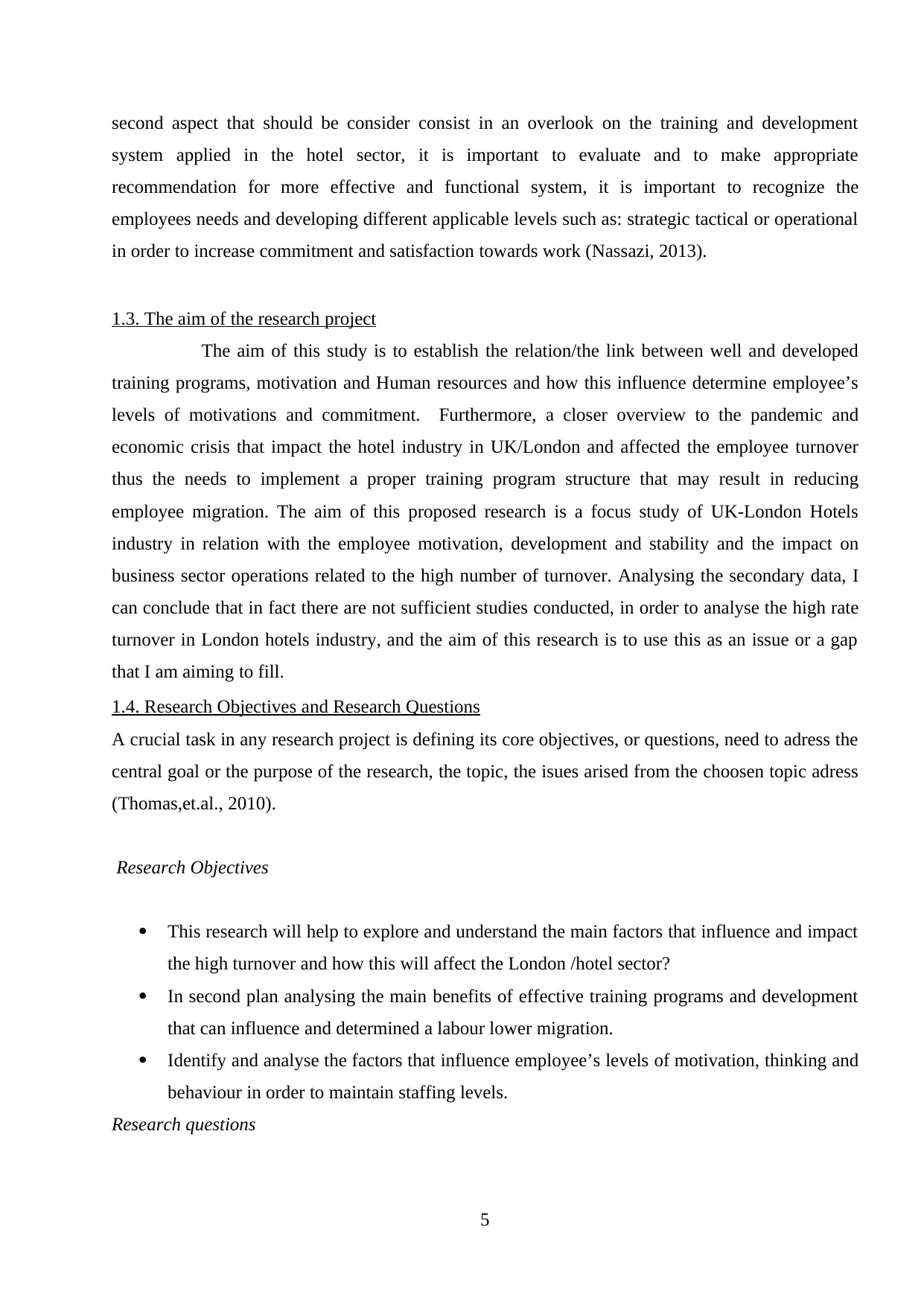
second aspect that should be consider consist in an overlook on the training and development
system applied in the hotel sector, it is important to evaluate and to make appropriate
recommendation for more effective and functional system, it is important to recognize the
employees needs and developing different applicable levels such as: strategic tactical or operational
in order to increase commitment and satisfaction towards work (Nassazi, 2013).
1.3. The aim of the research project
The aim of this study is to establish the relation/the link between well and developed
training programs, motivation and Human resources and how this influence determine employee’s
levels of motivations and commitment. Furthermore, a closer overview to the pandemic and
economic crisis that impact the hotel industry in UK/London and affected the employee turnover
thus the needs to implement a proper training program structure that may result in reducing
employee migration. The aim of this proposed research is a focus study of UK-London Hotels
industry in relation with the employee motivation, development and stability and the impact on
business sector operations related to the high number of turnover. Analysing the secondary data, I
can conclude that in fact there are not sufficient studies conducted, in order to analyse the high rate
turnover in London hotels industry, and the aim of this research is to use this as an issue or a gap
that I am aiming to fill.
1.4. Research Objectives and Research Questions
A crucial task in any research project is defining its core objectives, or questions, need to adress the
central goal or the purpose of the research, the topic, the isues arised from the choosen topic adress
(Thomas,et.al., 2010).
Research Objectives
This research will help to explore and understand the main factors that influence and impact
the high turnover and how this will affect the London /hotel sector?
In second plan analysing the main benefits of effective training programs and development
that can influence and determined a labour lower migration.
Identify and analyse the factors that influence employee’s levels of motivation, thinking and
behaviour in order to maintain staffing levels.
Research questions
5
system applied in the hotel sector, it is important to evaluate and to make appropriate
recommendation for more effective and functional system, it is important to recognize the
employees needs and developing different applicable levels such as: strategic tactical or operational
in order to increase commitment and satisfaction towards work (Nassazi, 2013).
1.3. The aim of the research project
The aim of this study is to establish the relation/the link between well and developed
training programs, motivation and Human resources and how this influence determine employee’s
levels of motivations and commitment. Furthermore, a closer overview to the pandemic and
economic crisis that impact the hotel industry in UK/London and affected the employee turnover
thus the needs to implement a proper training program structure that may result in reducing
employee migration. The aim of this proposed research is a focus study of UK-London Hotels
industry in relation with the employee motivation, development and stability and the impact on
business sector operations related to the high number of turnover. Analysing the secondary data, I
can conclude that in fact there are not sufficient studies conducted, in order to analyse the high rate
turnover in London hotels industry, and the aim of this research is to use this as an issue or a gap
that I am aiming to fill.
1.4. Research Objectives and Research Questions
A crucial task in any research project is defining its core objectives, or questions, need to adress the
central goal or the purpose of the research, the topic, the isues arised from the choosen topic adress
(Thomas,et.al., 2010).
Research Objectives
This research will help to explore and understand the main factors that influence and impact
the high turnover and how this will affect the London /hotel sector?
In second plan analysing the main benefits of effective training programs and development
that can influence and determined a labour lower migration.
Identify and analyse the factors that influence employee’s levels of motivation, thinking and
behaviour in order to maintain staffing levels.
Research questions
5
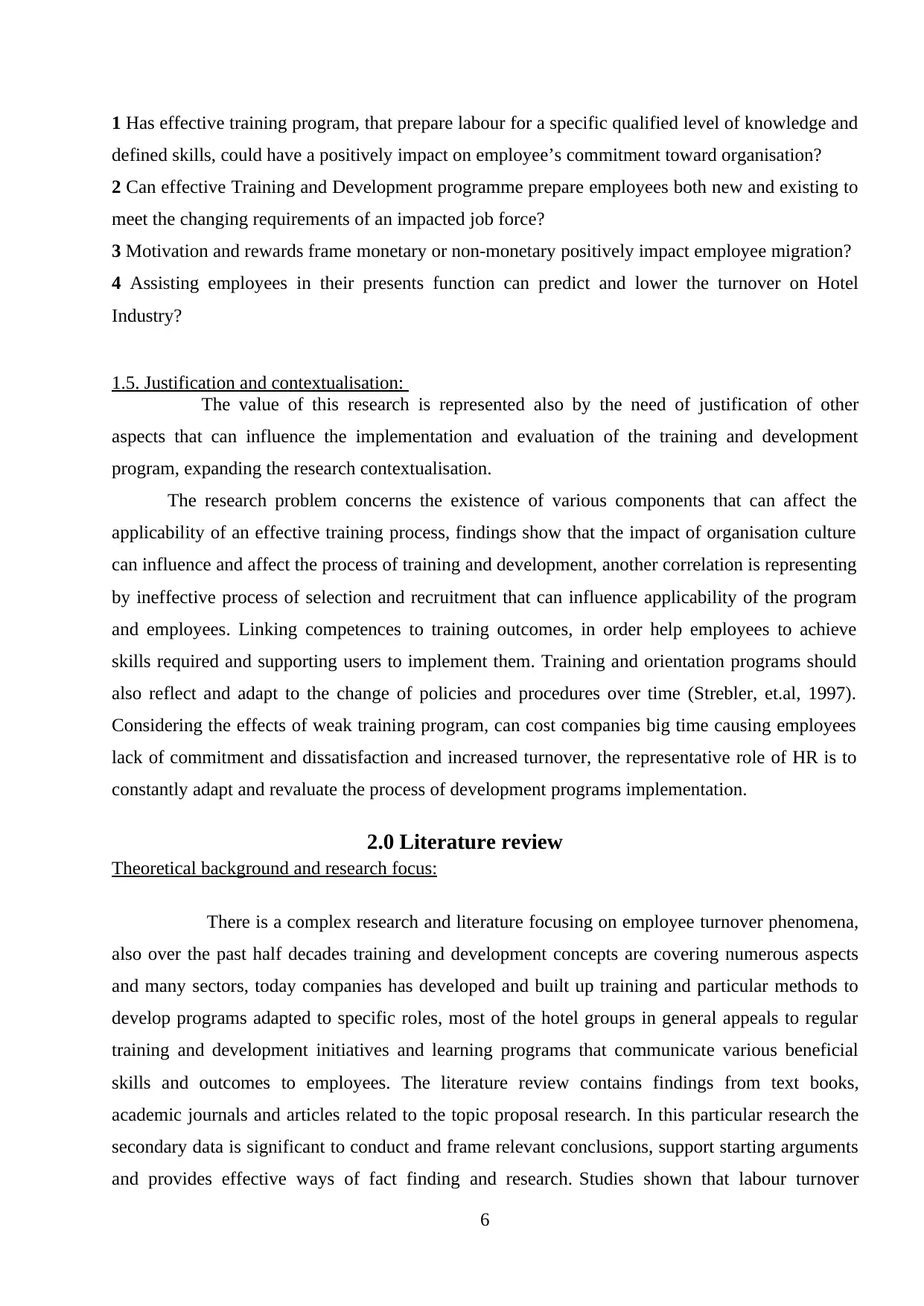
1 Has effective training program, that prepare labour for a specific qualified level of knowledge and
defined skills, could have a positively impact on employee’s commitment toward organisation?
2 Can effective Training and Development programme prepare employees both new and existing to
meet the changing requirements of an impacted job force?
3 Motivation and rewards frame monetary or non-monetary positively impact employee migration?
4 Assisting employees in their presents function can predict and lower the turnover on Hotel
Industry?
1.5. Justification and contextualisation:
The value of this research is represented also by the need of justification of other
aspects that can influence the implementation and evaluation of the training and development
program, expanding the research contextualisation.
The research problem concerns the existence of various components that can affect the
applicability of an effective training process, findings show that the impact of organisation culture
can influence and affect the process of training and development, another correlation is representing
by ineffective process of selection and recruitment that can influence applicability of the program
and employees. Linking competences to training outcomes, in order help employees to achieve
skills required and supporting users to implement them. Training and orientation programs should
also reflect and adapt to the change of policies and procedures over time (Strebler, et.al, 1997).
Considering the effects of weak training program, can cost companies big time causing employees
lack of commitment and dissatisfaction and increased turnover, the representative role of HR is to
constantly adapt and revaluate the process of development programs implementation.
2.0 Literature review
Theoretical background and research focus:
There is a complex research and literature focusing on employee turnover phenomena,
also over the past half decades training and development concepts are covering numerous aspects
and many sectors, today companies has developed and built up training and particular methods to
develop programs adapted to specific roles, most of the hotel groups in general appeals to regular
training and development initiatives and learning programs that communicate various beneficial
skills and outcomes to employees. The literature review contains findings from text books,
academic journals and articles related to the topic proposal research. In this particular research the
secondary data is significant to conduct and frame relevant conclusions, support starting arguments
and provides effective ways of fact finding and research. Studies shown that labour turnover
6
defined skills, could have a positively impact on employee’s commitment toward organisation?
2 Can effective Training and Development programme prepare employees both new and existing to
meet the changing requirements of an impacted job force?
3 Motivation and rewards frame monetary or non-monetary positively impact employee migration?
4 Assisting employees in their presents function can predict and lower the turnover on Hotel
Industry?
1.5. Justification and contextualisation:
The value of this research is represented also by the need of justification of other
aspects that can influence the implementation and evaluation of the training and development
program, expanding the research contextualisation.
The research problem concerns the existence of various components that can affect the
applicability of an effective training process, findings show that the impact of organisation culture
can influence and affect the process of training and development, another correlation is representing
by ineffective process of selection and recruitment that can influence applicability of the program
and employees. Linking competences to training outcomes, in order help employees to achieve
skills required and supporting users to implement them. Training and orientation programs should
also reflect and adapt to the change of policies and procedures over time (Strebler, et.al, 1997).
Considering the effects of weak training program, can cost companies big time causing employees
lack of commitment and dissatisfaction and increased turnover, the representative role of HR is to
constantly adapt and revaluate the process of development programs implementation.
2.0 Literature review
Theoretical background and research focus:
There is a complex research and literature focusing on employee turnover phenomena,
also over the past half decades training and development concepts are covering numerous aspects
and many sectors, today companies has developed and built up training and particular methods to
develop programs adapted to specific roles, most of the hotel groups in general appeals to regular
training and development initiatives and learning programs that communicate various beneficial
skills and outcomes to employees. The literature review contains findings from text books,
academic journals and articles related to the topic proposal research. In this particular research the
secondary data is significant to conduct and frame relevant conclusions, support starting arguments
and provides effective ways of fact finding and research. Studies shown that labour turnover
6
⊘ This is a preview!⊘
Do you want full access?
Subscribe today to unlock all pages.

Trusted by 1+ million students worldwide
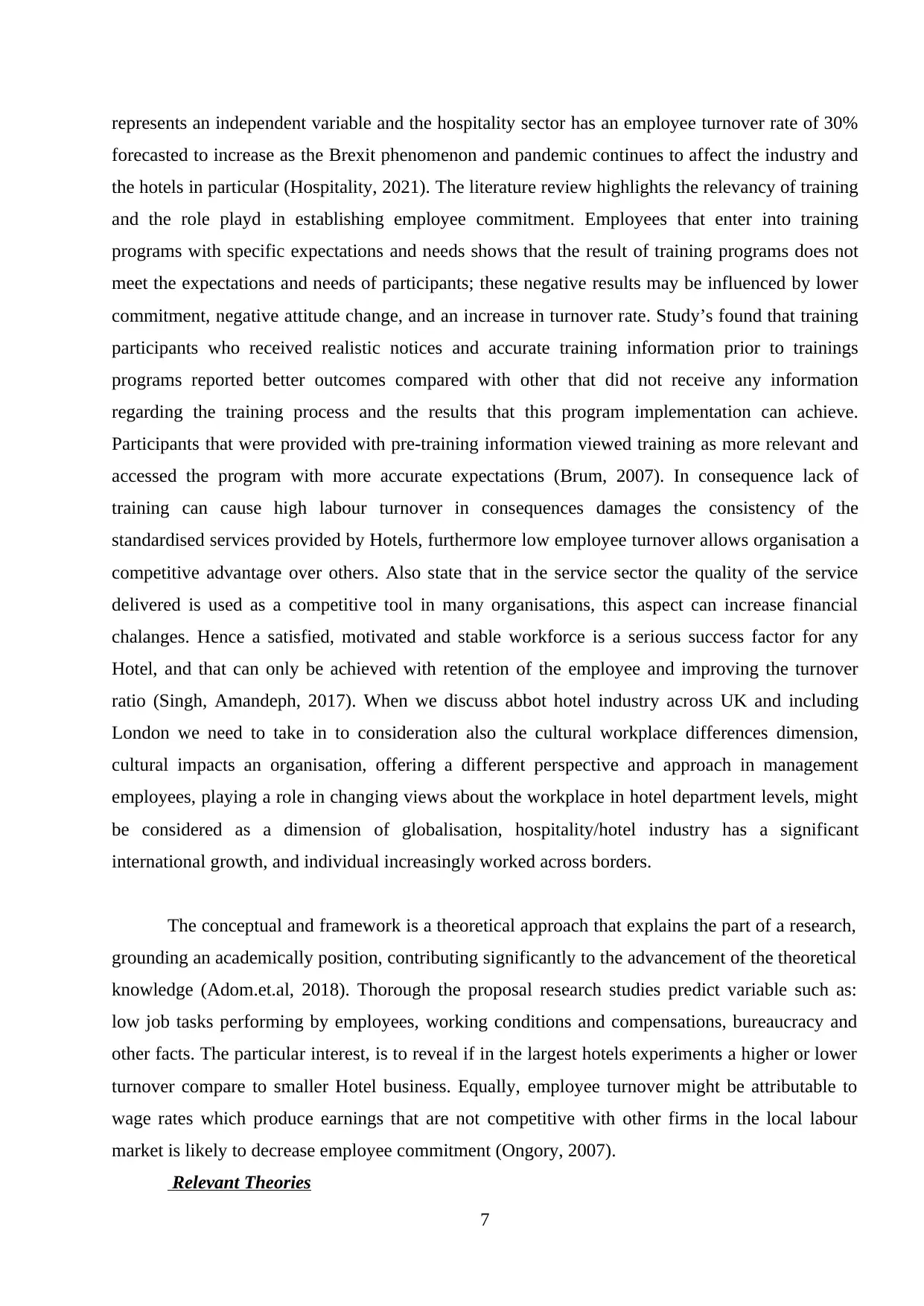
represents an independent variable and the hospitality sector has an employee turnover rate of 30%
forecasted to increase as the Brexit phenomenon and pandemic continues to affect the industry and
the hotels in particular (Hospitality, 2021). The literature review highlights the relevancy of training
and the role playd in establishing employee commitment. Employees that enter into training
programs with specific expectations and needs shows that the result of training programs does not
meet the expectations and needs of participants; these negative results may be influenced by lower
commitment, negative attitude change, and an increase in turnover rate. Study’s found that training
participants who received realistic notices and accurate training information prior to trainings
programs reported better outcomes compared with other that did not receive any information
regarding the training process and the results that this program implementation can achieve.
Participants that were provided with pre-training information viewed training as more relevant and
accessed the program with more accurate expectations (Brum, 2007). In consequence lack of
training can cause high labour turnover in consequences damages the consistency of the
standardised services provided by Hotels, furthermore low employee turnover allows organisation a
competitive advantage over others. Also state that in the service sector the quality of the service
delivered is used as a competitive tool in many organisations, this aspect can increase financial
chalanges. Hence a satisfied, motivated and stable workforce is a serious success factor for any
Hotel, and that can only be achieved with retention of the employee and improving the turnover
ratio (Singh, Amandeph, 2017). When we discuss abbot hotel industry across UK and including
London we need to take in to consideration also the cultural workplace differences dimension,
cultural impacts an organisation, offering a different perspective and approach in management
employees, playing a role in changing views about the workplace in hotel department levels, might
be considered as a dimension of globalisation, hospitality/hotel industry has a significant
international growth, and individual increasingly worked across borders.
The conceptual and framework is a theoretical approach that explains the part of a research,
grounding an academically position, contributing significantly to the advancement of the theoretical
knowledge (Adom.et.al, 2018). Thorough the proposal research studies predict variable such as:
low job tasks performing by employees, working conditions and compensations, bureaucracy and
other facts. The particular interest, is to reveal if in the largest hotels experiments a higher or lower
turnover compare to smaller Hotel business. Equally, employee turnover might be attributable to
wage rates which produce earnings that are not competitive with other firms in the local labour
market is likely to decrease employee commitment (Ongory, 2007).
Relevant Theories
7
forecasted to increase as the Brexit phenomenon and pandemic continues to affect the industry and
the hotels in particular (Hospitality, 2021). The literature review highlights the relevancy of training
and the role playd in establishing employee commitment. Employees that enter into training
programs with specific expectations and needs shows that the result of training programs does not
meet the expectations and needs of participants; these negative results may be influenced by lower
commitment, negative attitude change, and an increase in turnover rate. Study’s found that training
participants who received realistic notices and accurate training information prior to trainings
programs reported better outcomes compared with other that did not receive any information
regarding the training process and the results that this program implementation can achieve.
Participants that were provided with pre-training information viewed training as more relevant and
accessed the program with more accurate expectations (Brum, 2007). In consequence lack of
training can cause high labour turnover in consequences damages the consistency of the
standardised services provided by Hotels, furthermore low employee turnover allows organisation a
competitive advantage over others. Also state that in the service sector the quality of the service
delivered is used as a competitive tool in many organisations, this aspect can increase financial
chalanges. Hence a satisfied, motivated and stable workforce is a serious success factor for any
Hotel, and that can only be achieved with retention of the employee and improving the turnover
ratio (Singh, Amandeph, 2017). When we discuss abbot hotel industry across UK and including
London we need to take in to consideration also the cultural workplace differences dimension,
cultural impacts an organisation, offering a different perspective and approach in management
employees, playing a role in changing views about the workplace in hotel department levels, might
be considered as a dimension of globalisation, hospitality/hotel industry has a significant
international growth, and individual increasingly worked across borders.
The conceptual and framework is a theoretical approach that explains the part of a research,
grounding an academically position, contributing significantly to the advancement of the theoretical
knowledge (Adom.et.al, 2018). Thorough the proposal research studies predict variable such as:
low job tasks performing by employees, working conditions and compensations, bureaucracy and
other facts. The particular interest, is to reveal if in the largest hotels experiments a higher or lower
turnover compare to smaller Hotel business. Equally, employee turnover might be attributable to
wage rates which produce earnings that are not competitive with other firms in the local labour
market is likely to decrease employee commitment (Ongory, 2007).
Relevant Theories
7
Paraphrase This Document
Need a fresh take? Get an instant paraphrase of this document with our AI Paraphraser
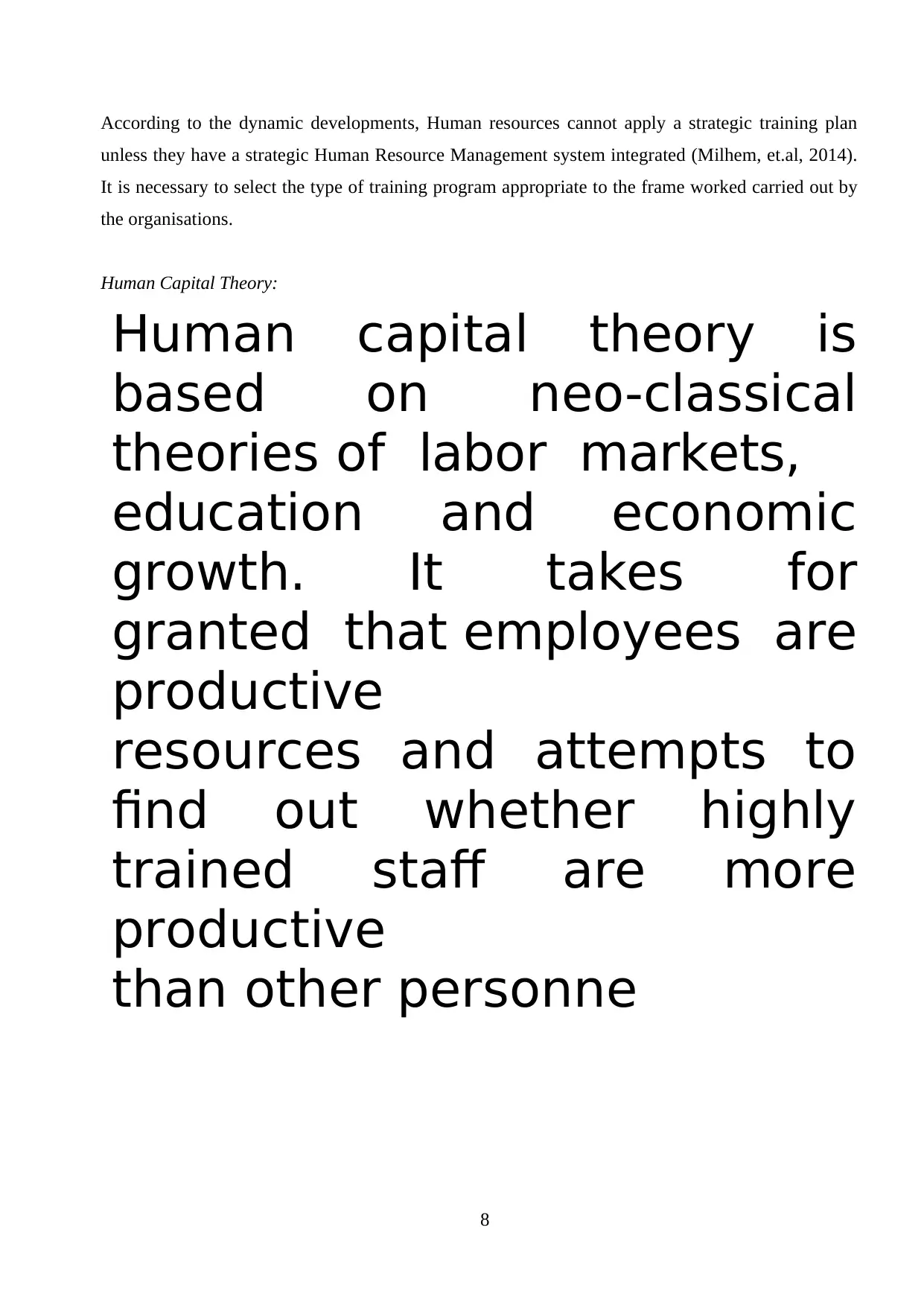
According to the dynamic developments, Human resources cannot apply a strategic training plan
unless they have a strategic Human Resource Management system integrated (Milhem, et.al, 2014).
It is necessary to select the type of training program appropriate to the frame worked carried out by
the organisations.
Human Capital Theory:
Human capital theory is
based on neo-classical
theories of labor markets,
education and economic
growth. It takes for
granted that employees are
productive
resources and attempts to
find out whether highly
trained staff are more
productive
than other personne
8
unless they have a strategic Human Resource Management system integrated (Milhem, et.al, 2014).
It is necessary to select the type of training program appropriate to the frame worked carried out by
the organisations.
Human Capital Theory:
Human capital theory is
based on neo-classical
theories of labor markets,
education and economic
growth. It takes for
granted that employees are
productive
resources and attempts to
find out whether highly
trained staff are more
productive
than other personne
8
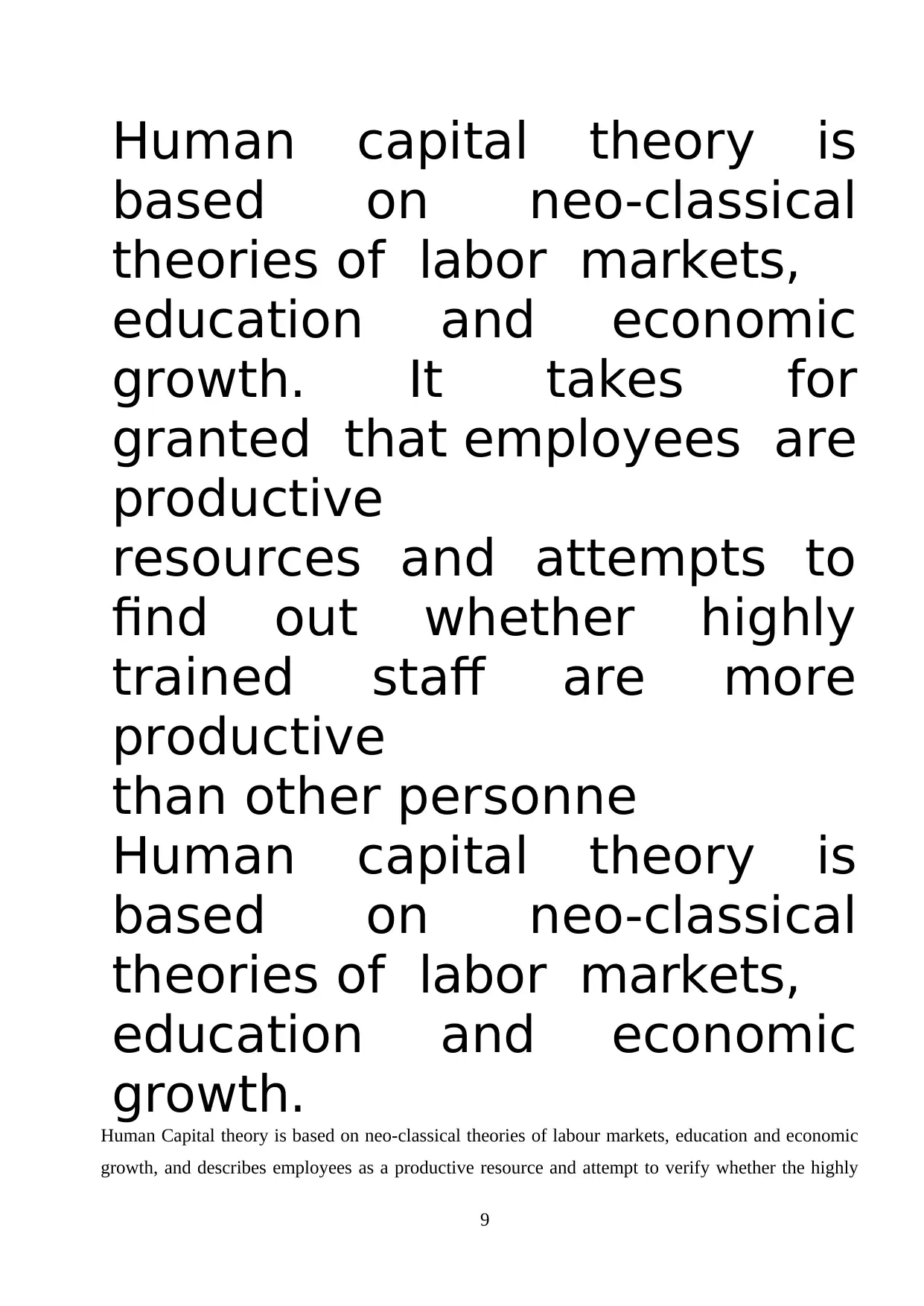
Human capital theory is
based on neo-classical
theories of labor markets,
education and economic
growth. It takes for
granted that employees are
productive
resources and attempts to
find out whether highly
trained staff are more
productive
than other personne
Human capital theory is
based on neo-classical
theories of labor markets,
education and economic
growth.
Human Capital theory is based on neo-classical theories of labour markets, education and economic
growth, and describes employees as a productive resource and attempt to verify whether the highly
9
based on neo-classical
theories of labor markets,
education and economic
growth. It takes for
granted that employees are
productive
resources and attempts to
find out whether highly
trained staff are more
productive
than other personne
Human capital theory is
based on neo-classical
theories of labor markets,
education and economic
growth.
Human Capital theory is based on neo-classical theories of labour markets, education and economic
growth, and describes employees as a productive resource and attempt to verify whether the highly
9
⊘ This is a preview!⊘
Do you want full access?
Subscribe today to unlock all pages.

Trusted by 1+ million students worldwide
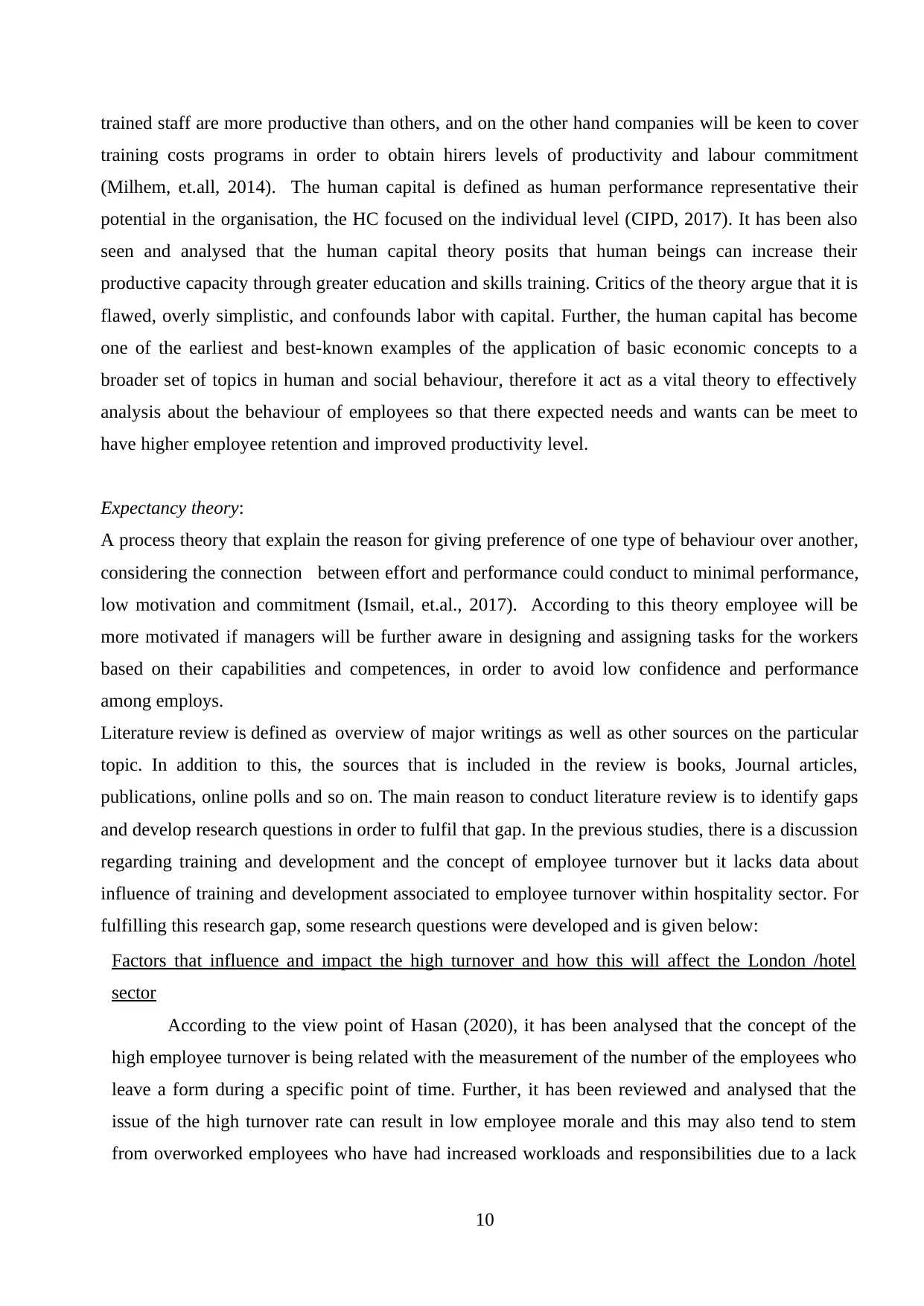
trained staff are more productive than others, and on the other hand companies will be keen to cover
training costs programs in order to obtain hirers levels of productivity and labour commitment
(Milhem, et.all, 2014). The human capital is defined as human performance representative their
potential in the organisation, the HC focused on the individual level (CIPD, 2017). It has been also
seen and analysed that the human capital theory posits that human beings can increase their
productive capacity through greater education and skills training. Critics of the theory argue that it is
flawed, overly simplistic, and confounds labor with capital. Further, the human capital has become
one of the earliest and best-known examples of the application of basic economic concepts to a
broader set of topics in human and social behaviour, therefore it act as a vital theory to effectively
analysis about the behaviour of employees so that there expected needs and wants can be meet to
have higher employee retention and improved productivity level.
Expectancy theory:
A process theory that explain the reason for giving preference of one type of behaviour over another,
considering the connection between effort and performance could conduct to minimal performance,
low motivation and commitment (Ismail, et.al., 2017). According to this theory employee will be
more motivated if managers will be further aware in designing and assigning tasks for the workers
based on their capabilities and competences, in order to avoid low confidence and performance
among employs.
Literature review is defined as overview of major writings as well as other sources on the particular
topic. In addition to this, the sources that is included in the review is books, Journal articles,
publications, online polls and so on. The main reason to conduct literature review is to identify gaps
and develop research questions in order to fulfil that gap. In the previous studies, there is a discussion
regarding training and development and the concept of employee turnover but it lacks data about
influence of training and development associated to employee turnover within hospitality sector. For
fulfilling this research gap, some research questions were developed and is given below:
Factors that influence and impact the high turnover and how this will affect the London /hotel
sector
According to the view point of Hasan (2020), it has been analysed that the concept of the
high employee turnover is being related with the measurement of the number of the employees who
leave a form during a specific point of time. Further, it has been reviewed and analysed that the
issue of the high turnover rate can result in low employee morale and this may also tend to stem
from overworked employees who have had increased workloads and responsibilities due to a lack
10
training costs programs in order to obtain hirers levels of productivity and labour commitment
(Milhem, et.all, 2014). The human capital is defined as human performance representative their
potential in the organisation, the HC focused on the individual level (CIPD, 2017). It has been also
seen and analysed that the human capital theory posits that human beings can increase their
productive capacity through greater education and skills training. Critics of the theory argue that it is
flawed, overly simplistic, and confounds labor with capital. Further, the human capital has become
one of the earliest and best-known examples of the application of basic economic concepts to a
broader set of topics in human and social behaviour, therefore it act as a vital theory to effectively
analysis about the behaviour of employees so that there expected needs and wants can be meet to
have higher employee retention and improved productivity level.
Expectancy theory:
A process theory that explain the reason for giving preference of one type of behaviour over another,
considering the connection between effort and performance could conduct to minimal performance,
low motivation and commitment (Ismail, et.al., 2017). According to this theory employee will be
more motivated if managers will be further aware in designing and assigning tasks for the workers
based on their capabilities and competences, in order to avoid low confidence and performance
among employs.
Literature review is defined as overview of major writings as well as other sources on the particular
topic. In addition to this, the sources that is included in the review is books, Journal articles,
publications, online polls and so on. The main reason to conduct literature review is to identify gaps
and develop research questions in order to fulfil that gap. In the previous studies, there is a discussion
regarding training and development and the concept of employee turnover but it lacks data about
influence of training and development associated to employee turnover within hospitality sector. For
fulfilling this research gap, some research questions were developed and is given below:
Factors that influence and impact the high turnover and how this will affect the London /hotel
sector
According to the view point of Hasan (2020), it has been analysed that the concept of the
high employee turnover is being related with the measurement of the number of the employees who
leave a form during a specific point of time. Further, it has been reviewed and analysed that the
issue of the high turnover rate can result in low employee morale and this may also tend to stem
from overworked employees who have had increased workloads and responsibilities due to a lack
10
Paraphrase This Document
Need a fresh take? Get an instant paraphrase of this document with our AI Paraphraser
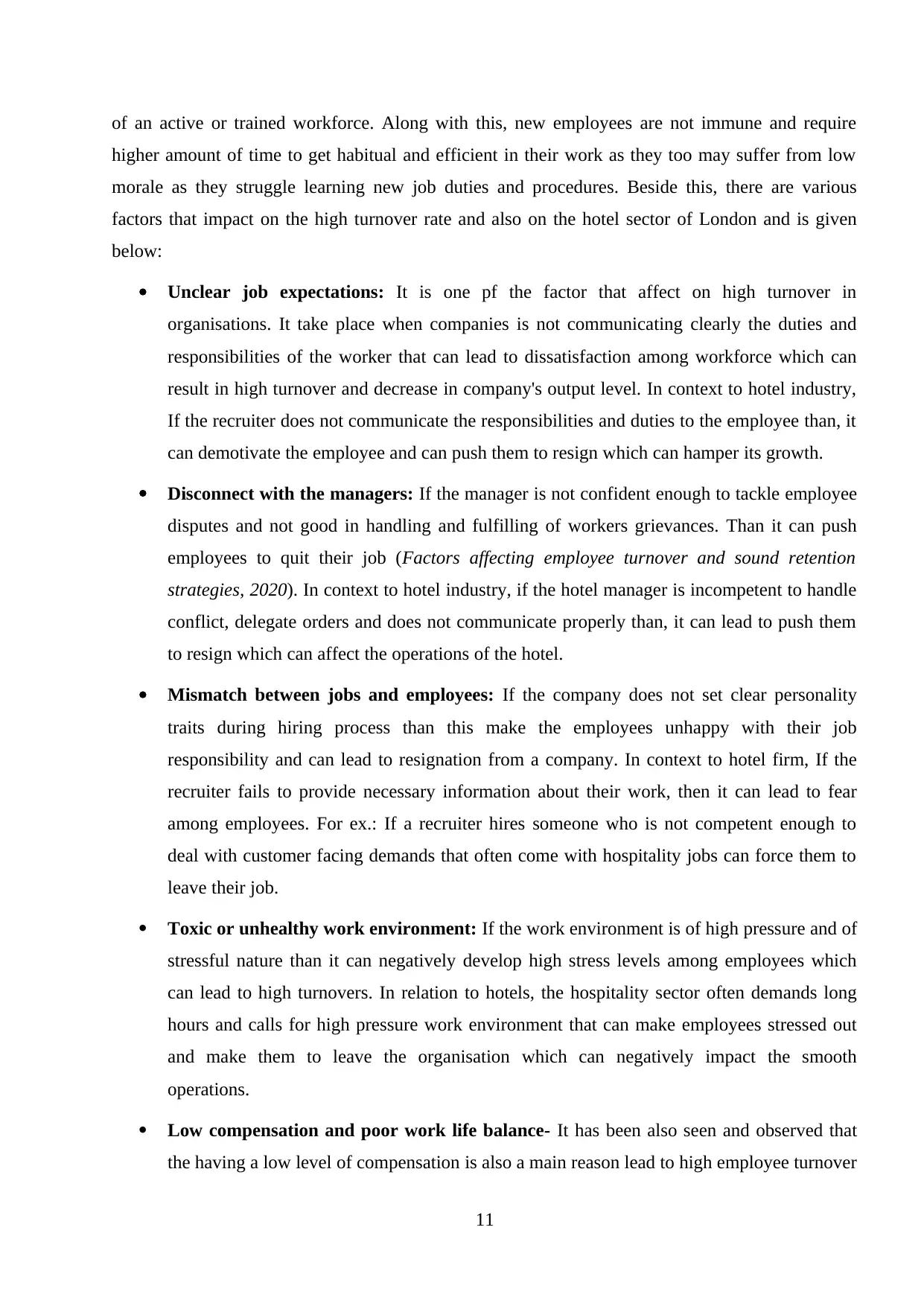
of an active or trained workforce. Along with this, new employees are not immune and require
higher amount of time to get habitual and efficient in their work as they too may suffer from low
morale as they struggle learning new job duties and procedures. Beside this, there are various
factors that impact on the high turnover rate and also on the hotel sector of London and is given
below:
Unclear job expectations: It is one pf the factor that affect on high turnover in
organisations. It take place when companies is not communicating clearly the duties and
responsibilities of the worker that can lead to dissatisfaction among workforce which can
result in high turnover and decrease in company's output level. In context to hotel industry,
If the recruiter does not communicate the responsibilities and duties to the employee than, it
can demotivate the employee and can push them to resign which can hamper its growth.
Disconnect with the managers: If the manager is not confident enough to tackle employee
disputes and not good in handling and fulfilling of workers grievances. Than it can push
employees to quit their job (Factors affecting employee turnover and sound retention
strategies, 2020). In context to hotel industry, if the hotel manager is incompetent to handle
conflict, delegate orders and does not communicate properly than, it can lead to push them
to resign which can affect the operations of the hotel.
Mismatch between jobs and employees: If the company does not set clear personality
traits during hiring process than this make the employees unhappy with their job
responsibility and can lead to resignation from a company. In context to hotel firm, If the
recruiter fails to provide necessary information about their work, then it can lead to fear
among employees. For ex.: If a recruiter hires someone who is not competent enough to
deal with customer facing demands that often come with hospitality jobs can force them to
leave their job.
Toxic or unhealthy work environment: If the work environment is of high pressure and of
stressful nature than it can negatively develop high stress levels among employees which
can lead to high turnovers. In relation to hotels, the hospitality sector often demands long
hours and calls for high pressure work environment that can make employees stressed out
and make them to leave the organisation which can negatively impact the smooth
operations.
Low compensation and poor work life balance- It has been also seen and observed that
the having a low level of compensation is also a main reason lead to high employee turnover
11
higher amount of time to get habitual and efficient in their work as they too may suffer from low
morale as they struggle learning new job duties and procedures. Beside this, there are various
factors that impact on the high turnover rate and also on the hotel sector of London and is given
below:
Unclear job expectations: It is one pf the factor that affect on high turnover in
organisations. It take place when companies is not communicating clearly the duties and
responsibilities of the worker that can lead to dissatisfaction among workforce which can
result in high turnover and decrease in company's output level. In context to hotel industry,
If the recruiter does not communicate the responsibilities and duties to the employee than, it
can demotivate the employee and can push them to resign which can hamper its growth.
Disconnect with the managers: If the manager is not confident enough to tackle employee
disputes and not good in handling and fulfilling of workers grievances. Than it can push
employees to quit their job (Factors affecting employee turnover and sound retention
strategies, 2020). In context to hotel industry, if the hotel manager is incompetent to handle
conflict, delegate orders and does not communicate properly than, it can lead to push them
to resign which can affect the operations of the hotel.
Mismatch between jobs and employees: If the company does not set clear personality
traits during hiring process than this make the employees unhappy with their job
responsibility and can lead to resignation from a company. In context to hotel firm, If the
recruiter fails to provide necessary information about their work, then it can lead to fear
among employees. For ex.: If a recruiter hires someone who is not competent enough to
deal with customer facing demands that often come with hospitality jobs can force them to
leave their job.
Toxic or unhealthy work environment: If the work environment is of high pressure and of
stressful nature than it can negatively develop high stress levels among employees which
can lead to high turnovers. In relation to hotels, the hospitality sector often demands long
hours and calls for high pressure work environment that can make employees stressed out
and make them to leave the organisation which can negatively impact the smooth
operations.
Low compensation and poor work life balance- It has been also seen and observed that
the having a low level of compensation is also a main reason lead to high employee turnover
11
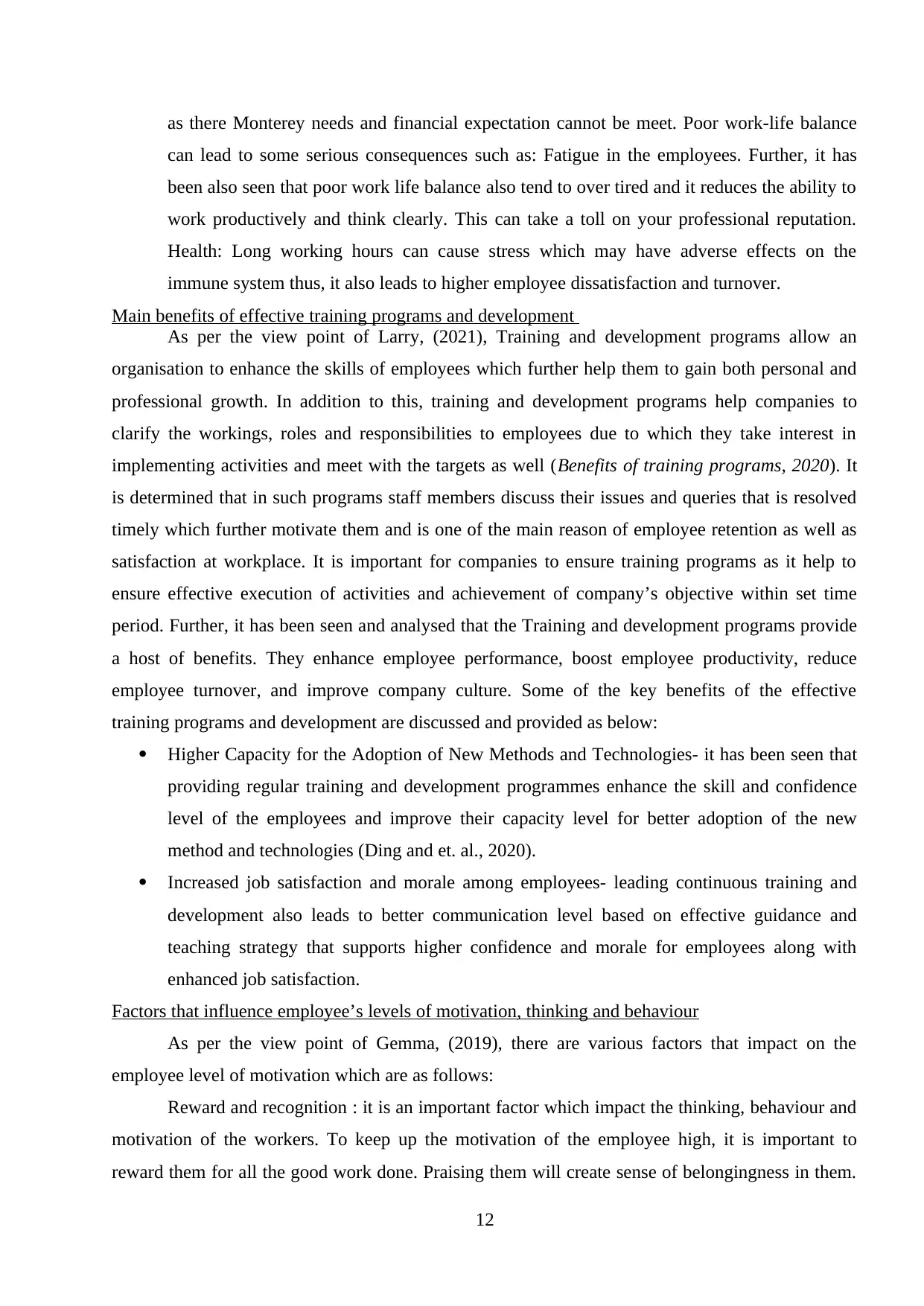
as there Monterey needs and financial expectation cannot be meet. Poor work-life balance
can lead to some serious consequences such as: Fatigue in the employees. Further, it has
been also seen that poor work life balance also tend to over tired and it reduces the ability to
work productively and think clearly. This can take a toll on your professional reputation.
Health: Long working hours can cause stress which may have adverse effects on the
immune system thus, it also leads to higher employee dissatisfaction and turnover.
Main benefits of effective training programs and development
As per the view point of Larry, (2021), Training and development programs allow an
organisation to enhance the skills of employees which further help them to gain both personal and
professional growth. In addition to this, training and development programs help companies to
clarify the workings, roles and responsibilities to employees due to which they take interest in
implementing activities and meet with the targets as well (Benefits of training programs, 2020). It
is determined that in such programs staff members discuss their issues and queries that is resolved
timely which further motivate them and is one of the main reason of employee retention as well as
satisfaction at workplace. It is important for companies to ensure training programs as it help to
ensure effective execution of activities and achievement of company’s objective within set time
period. Further, it has been seen and analysed that the Training and development programs provide
a host of benefits. They enhance employee performance, boost employee productivity, reduce
employee turnover, and improve company culture. Some of the key benefits of the effective
training programs and development are discussed and provided as below:
Higher Capacity for the Adoption of New Methods and Technologies- it has been seen that
providing regular training and development programmes enhance the skill and confidence
level of the employees and improve their capacity level for better adoption of the new
method and technologies (Ding and et. al., 2020).
Increased job satisfaction and morale among employees- leading continuous training and
development also leads to better communication level based on effective guidance and
teaching strategy that supports higher confidence and morale for employees along with
enhanced job satisfaction.
Factors that influence employee’s levels of motivation, thinking and behaviour
As per the view point of Gemma, (2019), there are various factors that impact on the
employee level of motivation which are as follows:
Reward and recognition : it is an important factor which impact the thinking, behaviour and
motivation of the workers. To keep up the motivation of the employee high, it is important to
reward them for all the good work done. Praising them will create sense of belongingness in them.
12
can lead to some serious consequences such as: Fatigue in the employees. Further, it has
been also seen that poor work life balance also tend to over tired and it reduces the ability to
work productively and think clearly. This can take a toll on your professional reputation.
Health: Long working hours can cause stress which may have adverse effects on the
immune system thus, it also leads to higher employee dissatisfaction and turnover.
Main benefits of effective training programs and development
As per the view point of Larry, (2021), Training and development programs allow an
organisation to enhance the skills of employees which further help them to gain both personal and
professional growth. In addition to this, training and development programs help companies to
clarify the workings, roles and responsibilities to employees due to which they take interest in
implementing activities and meet with the targets as well (Benefits of training programs, 2020). It
is determined that in such programs staff members discuss their issues and queries that is resolved
timely which further motivate them and is one of the main reason of employee retention as well as
satisfaction at workplace. It is important for companies to ensure training programs as it help to
ensure effective execution of activities and achievement of company’s objective within set time
period. Further, it has been seen and analysed that the Training and development programs provide
a host of benefits. They enhance employee performance, boost employee productivity, reduce
employee turnover, and improve company culture. Some of the key benefits of the effective
training programs and development are discussed and provided as below:
Higher Capacity for the Adoption of New Methods and Technologies- it has been seen that
providing regular training and development programmes enhance the skill and confidence
level of the employees and improve their capacity level for better adoption of the new
method and technologies (Ding and et. al., 2020).
Increased job satisfaction and morale among employees- leading continuous training and
development also leads to better communication level based on effective guidance and
teaching strategy that supports higher confidence and morale for employees along with
enhanced job satisfaction.
Factors that influence employee’s levels of motivation, thinking and behaviour
As per the view point of Gemma, (2019), there are various factors that impact on the
employee level of motivation which are as follows:
Reward and recognition : it is an important factor which impact the thinking, behaviour and
motivation of the workers. To keep up the motivation of the employee high, it is important to
reward them for all the good work done. Praising them will create sense of belongingness in them.
12
⊘ This is a preview!⊘
Do you want full access?
Subscribe today to unlock all pages.

Trusted by 1+ million students worldwide
1 out of 26
Related Documents
Your All-in-One AI-Powered Toolkit for Academic Success.
+13062052269
info@desklib.com
Available 24*7 on WhatsApp / Email
![[object Object]](/_next/static/media/star-bottom.7253800d.svg)
Unlock your academic potential
Copyright © 2020–2025 A2Z Services. All Rights Reserved. Developed and managed by ZUCOL.




